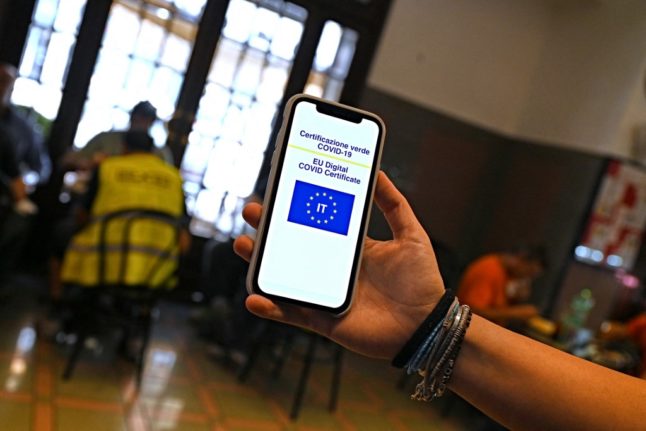*ALERT: Switzerland announces extension of Covid certificates – Follow the latest news HERE.
Switzerland’s Federal Council is set to extend the Covid certificate from September 13th, after previously delaying its decision by a week.
In a press conference on Wednesday Health Minister Alain Berset said the Covid certificate would now be required in almost all indoor areas, other than a handful of exceptions.
Covid certificates will be required to enter indoor areas of restaurants, bars, fitness centres, as well as sports events, cultural facilities, and private parties, as is currently the case in most of Switzerland’s neighbour countries.
READ MORE: When will Switzerland decide whether to enforce the Covid certificate in restaurants?
The certificate will also be required in the workplace in many instances.
Even though this plan was set to be approved on September 1st after being put out for consultation in late August, authorities postponed its implementation due to a slower than expected increase in hospitalisations at the time.
However, the number of admissions to intensive care units has increased in the past few days, with Swiss intensive care units having more Covid-related patients than any other European country on a per capita basis.
A number of cantons have reached or are reaching their full capacities in all of their ICUs.
On a nationwide basis, ICUs are at 87 percent capacity, as at September 7th.
READ MORE: Why does Switzerland have the most Covid-related ICU patients in Europe?



 Please whitelist us to continue reading.
Please whitelist us to continue reading.
OK, but how many ICU are available? There are reports showing that the capacity of ICU units have been severely decreased during the pandemics. I see this as a form of coercion and discrimination, linked to the obligation of administering an experimental vaccine with proven short term side effects, and unknown long term consequences.
This is precisely what’s happening. A good friend of mine works as a consultant with one of the hospital groups and they reduced beds overall and including ICU beds. It’s definitely all about coercion and threats. Also, the comment “…Covid certificates will be required to enter indoor areas of…, as is currently the case in most of Switzerland’s neighbour countries.” Is this how we make decisions now? Johnny got a new bike so I want one too.
A lot of good the vaccines are doing. At my husband’s small office of 14…3 got covid (2x jabbed) but my husband not. He had a covid test about 3 days before they found out they were sick and he got one a few days after they notified him. Both times he was negative. So how the heck does a passport stop the spread of the virus? It doesn’t. It’s a GREAT BIG STICK. I have a friend currently suffering through a terrible bout of Shingles after her Pfizer jab. The pharmacist told her they are getting a lot of people coming in with shingles after their shots. Meanwhile she has worked throughout the entire pandemic in a service facing job with the public and was never sick. Now this. She’s on sick leave.